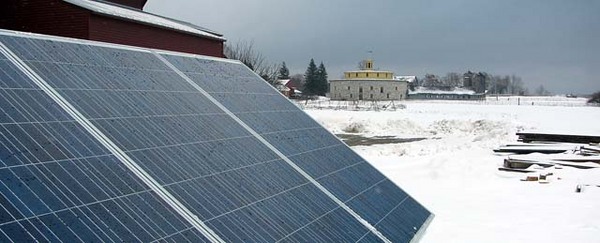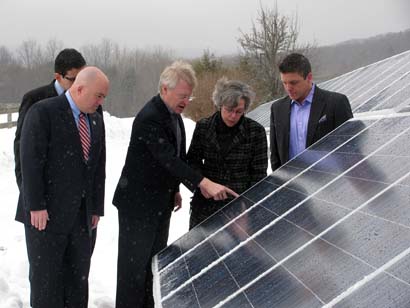
Berkshire 'Bundle' Model for Solar-Power Partnerships
 Alteris Renewables President Ron French explains how the panels are constructed to Berkshire Bank VP Andres Garzon, left, state Rep. Denis E. Guyer, D-Dalton, Shaker Village director Ellen Spears and Tyler Fairbank of EOS. |
"It's the perfect place to be talking about solar power ... the Shakers who were here from the 1790s were green before green had a name," said Ellen Spears, executive director of the historic village.
All together, the diverse collection of businesses, schools and nonprofits will have a capacity of 811 kilowatts of electricity through more than 4,000 photovoltaic panels. The bundle represents $4.5 million in capital investment and will generate up to 888,000 Kw-hours a year and save about 4.3 million pounds of carbon dioxide over 25 years. That's equal to planting 200,000 trees or taking 130 cars off the road each year.
The partnership was sewn together by EOS Ventures LLC, the 2-year-old renewable energy services company headed by Tyler Fairbank, and financed through Berkshire Bank and state grants.
"This project is a model for the rest of the country and a testament to the unique spirit of cooperation and innovation that makes Berkshire County a great place to work and live," said Andres Garzon, vice president and controller for Berkshire Bank.
EOS owns and operates the arrays set up at each entity, then sells the power back to the host at a contracted rate over 20 years with signifcant savings. The array at Hancock Shaker Village will produce more than a third of its energy and save an estimated $4,500 annually.
Along with the village, the bundle includes the Bedard Brothers dealership in Cheshire, Berkshire South Regional Community Center in Great Barrington, Quality Printing Co. in Pittsfield, the town of West Stockbridge, Brandeis University in Waltham and Wheeler School of Providence, R.I., which now hosts the largest solar array in southeast Mass. on its fieldhouse in Seekonk.
The Berkshire Bundle came about through necessity, said Fairbank, in large part because of grant changes.
"What is particularly unique is that on their own, not one of these projects would have happened this past year," he said. "We'd been working with each entity to install solar arrays but due to the shifting grant-funding environment in Massachusetts last summer, we were just unable to make the the numbers work.
"However, by coming together in one project, the Berkshire Bundle, we were able to make all seven projects a reality."
While dropping in cost, solar installations can be extremely expensive and monetizing tax credits difficult for smaller entities. Most "bundling" is done out West on a larger scale, a megawatt or more. The linchpin was Berkshire Bank, said Fairbank, which became the equity partner — and a national leader in developing financial structuring for renewable energy projects.
 Shaker Village is one of seven partners in a renewable energy 'bundle'; EOS owns the arrays at each location and sells the power back to the hosts at a low, contracted rate. |
The project came together after the state's Commonwealth Solar Initiative's funding changed in mid-August; from there, it was a sprint to get permits, funding and the installations by Alteris Renewables (which also recently installed the solar array at Country Curtains) up and running by Dec. 31, 2009, to take advantage of the grants.
All seven are operational, although awaiting final utility checks to go on line, likely in the next week.
Eliza Crescentini, executive director of Berkshire South, described the project as "this great story that the dreams we have today can be made real by leadership and vision and a collective coming together of community."
At the Shaker Village, the modern barnlike structure at the entrance offered the perfect south-facing site for roof panels and a small field of solar panels below without intruding on the historic village.
The prominent display will provide the jumping off point for lessons on the sustainable and principled lifestyle embraced by the Shakers. From the modern photovoltaic system to the passive solar hen house, the village will seek to teach visitors things that they can take home to change the way they live or their community.
"We hope that the ripple effect will be that you can change the world," Spears said.















